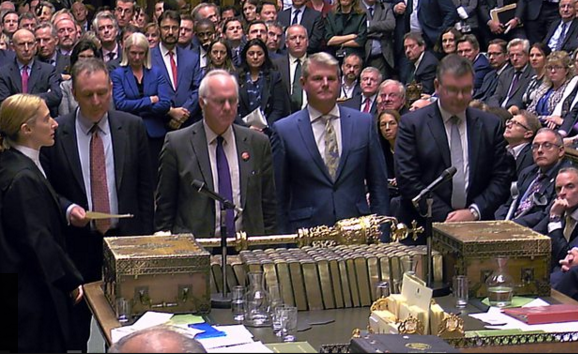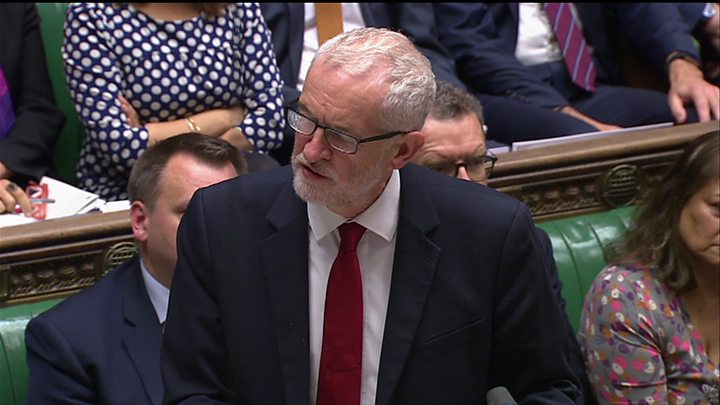UK: Brexit bill ‘in limbo’ as MPs reject timetable

From BBC
Boris Johnson has hit the pause button on his Brexit legislation after MPs rejected his plan to get it through the Commons in three days.
MPs backed his Withdrawal Agreement Bill – but minutes later voted against the timetable, leaving it “in limbo”.
After the vote, EU Council President Donald Tusk said he would recommend EU leaders backed an extension to the 31 October Brexit deadline.
But a No 10 source said if a delay was granted, the PM would seek an election.
On Saturday, Mr Johnson complied with a law demanding he write to the EU to ask for a three-month extension, but did not sign the letter.
Following the result in the Commons, he said it was Parliament and not the government that had requested an extension.
Mr Johnson said he would reiterate his pledge to EU leaders, telling them it was still his policy to leave by the end of October.
But Commons leader Jacob Rees-Mogg told MPs it was “very hard” to see how the necessary laws could be passed to leave with a deal by the deadline.
View from the EU
A spokesman from the European Commission said: “[The Commission] takes note of tonight’s result and expects the UK government to inform us about the next steps.”
But Mr Tusk tweeted he would “recommend the EU27 accept the UK request for an extension” in order to “avoid a no-deal Brexit”.
The BBC’s Europe editor Katya Adler said: “[The] temptation amongst most I speak to tonight in EU circles is to grant the 31 Jan extension.”
And the BBC’s political editor Laura Kuenssberg said that meant the government’s plan to seek an election was “looking likely”.
However, an EU source told BBC Brussels reporter Adam Fleming the bloc was considering a “flextension” – an extension with a maximum end date, but the flexibility for the UK to leave early if a deal is ratified.
Following Tuesday’s Commons votes, a Downing Street source said Parliament “blew its last chance”.
They added: “If Parliament’s delay is agreed by Brussels, then the only way the country can move on is with an election.”
Labour leader Jeremy Corbyn said Mr Johnson was “the author of his own misfortune”.
He told the Commons that MPs had “refused to be bounced into debating a hugely significantly piece of legislation in just two days, with barely any notice or an analysis of the economic impact of this bill”.
But Mr Corbyn offered to enter discussions over a “sensible” timetable for the PM’s deal to go through Parliament.


The SNP’s leader, Ian Blackford, said it was “another humiliating defeat” for the PM, and MPs had “spoken with a very clear voice to tell the PM he is not on”.
Liberal Democrat leader Jo Swinson called on Mr Johnson to “end the brinkmanship and replace it with some statesmanship” in order to secure an extension with the EU.
Brexit bill’s journey so far
Boris Johnson agreed his new plan with EU leaders last week, but has repeatedly pledged to leave the bloc by the end of October, with or without a deal.
This is despite him having to ask for an extension to Brexit on Saturday after MPs backed an amendment attempting to block a no-deal.
The bill that would turn his plan into law – the Withdrawal Agreement Bill – was published on Monday evening, and he urged MPs to back a three-day timetable to push it through the Commons ahead of the Halloween deadline.
The PM told Parliament if it “decides to delay everything until January or possibly longer”, he would seek an election – but he did not say what the government would do if the EU offered a shorter extension.
MPs did approve the bill on its first hurdle through the Commons – called the second reading – by 329 votes to 299.
But in a vote straight after, they rejected the so-called programme motion, in other words the planned timetable to get the bill through Parliament, by 14 votes after a number of MPs criticised the pace of the legislation.
What happens next?
Mr Johnson told the Commons: “I will speak to EU member states about their intentions [but] until they have reached a decision – until we reach a decision, I will say – we will pause this legislation.”
In the meantime, however, he said the government would “take the only responsible course and accelerate our preparations for a no deal outcome”.
The PM added: “Let me be clear. Our policy remains that we should not delay [and] that we should leave the EU on 31 October.”
If an election were to be triggered this week, the earliest it could take place would be Thursday 28 November, as the law requires 25 days between an election being called in Parliament and polling day.
But Mr Johnson cannot force an election himself and would need the backing of Parliament.
MPs had been due to debate the bill over Wednesday and Thursday, but will now return to discussing the contents of the Queen’s Speech – which put forward the government’s domestic agenda for the new session of Parliament.
For more on this story and video go to: https://www.bbc.com/news/uk-politics-50146182





